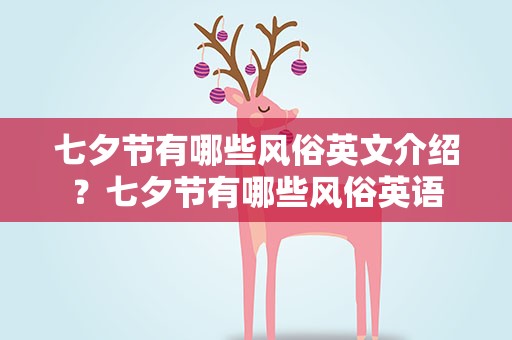七夕的英文介绍
七夕节英文介绍:

QixiFestival,originatinginChina,istheearliestlovefestivalintheworld.AmongthemanyfolkcustomsofQixiFestival,somegraduallydisappear,butaconsiderablepartofithasbeencontinuedbypeople.
InsomeAsiancountriesinfluencedbyChineseculture,suchasJapan,KoreanPeninsula,Vietnamandsoon,thereisalsoatraditionofcelebratingtheDoubleSeventhFestival.OnMay20,2006,QixiFestivalwaslistedinthefirstbatchofnationalintangibleculturalheritagelistbytheStateCouncilofthePeople'sRepublicofChina.
中文翻译:
七夕节发源于中国,是世界上最早的爱情节日,在七夕节的众多民俗当中,有些逐渐消失,但还有相当一部分被人们延续了下来。在部分受中华文化影响的亚洲国家如日本、朝鲜半岛、越南等也有庆祝七夕的传统。2006年5月20日,七夕节被中华人民共和国国务院列入第一批国家级非物质文化遗产名录。
七夕节,又称七巧节、七姐节、女儿节、乞巧节、七娘会、七夕祭、牛公牛婆日、巧夕等,是中国民间的传统节日。七夕节由星宿崇拜衍化而来,为传统意义上的七姐诞,因拜祭“七姐”活动在七月七晩上举行,故名“七夕”。
拜七姐,祈福许愿、乞求巧艺、坐看牵牛织女星、祈祷姻缘、储七夕水等,是七夕的传统习俗。经历史发展,七夕被赋予了“牛郎织女”的美丽爱情传说,使其成为了象征爱情的节日,从而被认为是中国最具浪漫色彩的传统节日,在当代更是产生了“中国情人节”的文化含义。
七夕的传统习俗英文版
1、香桥会
Inyixing,jiangsuprovince,thereareqixixiangqiaocustoms.
(在江苏宜兴,有七夕香桥会习俗。)
EveryyearontheChinesevalentine'sday,peoplecometotakepartinthefestival.
(每年七夕,人们都赶来参与,搭制香桥。)
2、接露水
Inthecountrysideofzhejiangprovince,thecustomofcatchingdewwithwashbasinispopular.
(浙江农村,流行用脸盆接露水的习俗。)
ItissaidthatthedewontheChinesevalentine'sdayisthetearswhenthecowherdandweavergirlmeet.
(传说七夕节时的露水是牛郎织女相会时的眼泪,如抹在眼上和手上,可使人眼明手快。)
3、拜七姐
July7'ssevennianghui,guangdongcalled"worshipsevensister",fujianTaiwaniscalled"worshipsevenniangma".
(七月七的七娘会,广东多称“拜七姐”,闽台即称为“拜七娘妈”。)
4、穿针乞巧
Threading,alsoknownas"saiqiao",thatis,women'scompetitionthreading.
(穿针乞巧,也叫“赛巧”,即女子比赛穿针。)
Theyweredecoratedwithcoloredthreadandworeseven-holeneedles.Thefastertheywore,themoretheybegged.
(她们结彩线,穿七孔针,谁穿得越快,就意味着谁乞到的巧越多。)
5、喜蛛应巧
Thetarantulashouldalsobeanearlierwayofbegging.
(喜蛛应巧也是较早的一种乞巧方式。)
Thecustomisalittlelaterthanthreadingneedlebegging,roughlyfromthenorthernandsoutherndynasties.
(其俗稍晚于穿针乞巧,大致起于南北朝之时。)
关于七夕节的英文介绍
七夕将至,你知道关于七夕节的英文介绍吗?下面我精心整理了关于七夕节的英文介绍的相关资料,希望可以帮到你!
关于七夕节的英文介绍
TheDoubleSeventhFestival,onthe7thdayofthe7thlunarmonth,isatraditionalfestivalfullofromance.ItoftengoesintoAugustintheGregoriancalendar
Thisfestivalisinmid-summerwhentheweatheriswarmandthegrassandtreesrevealtheirluxuriousgreens.Atnightwhentheskyisdottedwithstars,andpeoplecanseetheMilkyWayspanningfromthenorthtothesouth.Oneachbankofitisabrightstar,whichseeeachotherfromafar.TheyaretheCowherdandWeaverMaid,andaboutthemthereisabeautifullovestorypasseddownfromgenerationtogeneration.
Long,longago,therewasanhonestandkind-heartedfellownamedNiuLang(Cowhand).Hisparentsdiedwhenhewasachild.Laterhewasdrivenoutofhishomebyhissister-in-law.Sohelivedbyhimselfherdingcattleandfarming.Oneday,afairyfromheavenZhiNu(WeaverMaid)fellinlovewithhimandcamedownsecretlytoearthandmarriedhim.ThecowhandfarmedinthefieldandtheWeaverMaidwoveathome.Theylivedahappylifeandgavebirthtoaboyandagirl.Unfortunately,theGodofHeavensoonfoundoutthefactandorderedtheQueenMotheroftheWesternHeavenstobringtheWeaverMaidback.
Withthehelpofcelestialcattle,theCowhandflewtoheavenwithhissonanddaughter.Atthetimewhenhewasabouttocatchupwithhiswife,theQueenMothertookoffoneofhergoldhairpinsandmadeastroke.OnebillowyriverappearedinfrontoftheCowhand.TheCowhandandWeaverMaidwereseparatedonthetwobanksforeverandcouldonlyfeeltheirtears.Theirloyaltytolovetouchedmagpies,sotensofthousandsofmagpiescametobuildabridgefortheCowhandandWeaverMaidtomeeteachother.TheQueenMotherwaseventuallymovedandallowedthemtomeeteachyearonthe7thofthe7thlunarmonth.Hencetheirmeetingdatehasbeencalled"QiXi"(DoubleSeventh).
ScholarshaveshowntheDoubleSeventhFestivaloriginatedfromtheHanDynasty(206BC-AD220).HistoricaldocumentsfromtheEasternJinDynasty(AD371-420)mentionthefestival,whilerecordsfromtheTangDynasty(618-907)depictthegrandeveningbanquetofEmperorTaizongandhisconcubines.BytheSong(960-1279)andYuan(1279-1368)dynasties,specialarticlesforthe"QiXi"wereseenbeingsoldonmarketsinthecapital.Thebustlingmarketsdemonstratedthesignificanceofthefestival.
TodaysometraditionalcustomsarestillobservedinruralareasofChina,buthavebeenweakenedordilutedinurbancities.However,thelegendoftheCowhandandWeaverMaidhastakenrootintheheartsofthepeople.Inrecentyears,inparticular,urbanyouthshavecelebrateditasValentine'sDayinChina.Asaresult,ownersofflowershops,barsandstoresarefullofjoyastheysellmorecommoditiesforlove.
七夕吃鸡原因
为了表达人们希望牛郎织女能天天过上美好幸福家庭生活的愿望,在浙江金华一带,七月七日家家都要杀一只鸡,意为这夜牛郎织女相会,若无公鸡报晓,他们便能永远不分开。
传说中牛郎织女,每年只有在七夕,才得以鹊桥相会;而当雄鸡报晓时,他们就不得不分开了。古时人们因为同情牛郎织女,有流行在七夕宰鸡的风俗,以祈祷有情人永不分离。因此,七夕节,吃鸡成为很多地方的一种传统风俗。
在七夕,在城阳当地还有扣公鸡的习俗。以前一到七夕节,城阳这边有些人家就把自己家的大公鸡从鸡窝里掏出来,用筐子扣在屋子里,传说是王母娘娘规定,天亮鸡一叫,牛郎织女就得马上分开,所以大家就认为,公鸡换了生地方害怕,自然就不叫了,这样牛郎织女在一块的时间能长点。
七夕传统习俗
旧时风俗,农历七月七日夜(或七月六日夜),穿着新衣的少女们在庭院向织女星乞求智巧,称为“乞巧”。乞巧的方式大多是姑娘们穿针引线验巧,做些小物品赛巧,摆上些瓜果乞巧。近代的穿针引线、蒸巧馍馍、烙巧果子、生巧芽以及用面塑、剪纸、彩绣等形式做成的装饰品等亦是乞巧风俗的延伸。
“七夕”夜晚,年轻的妇女、姑娘要摆上事先准备好的时令水果,对着皎皎明月,朝天祭拜。她们还要举行各种乞巧仪式,虔诚地乞求织女神赋予她们聪慧的巧手,祈求自己能够得到美满爱情的姻缘巧配。
在浙江一带,很多人家晚上还会在打扫干净的庭院里,摆上巧果、莲蓬、白藕、红菱等,家中亲友围坐在一起。
在福建地区,许多人在“七夕”节时都要准备节日食品,让织女欣赏、品尝,祈求她保佑来年瓜果丰收。大伙儿轮流在供桌前焚香祭拜,默祷心愿。人们有的乞巧,有的乞子、乞寿、祈求爱情,等等。
猜你喜欢:
1.七夕节英文作文
2.介绍七夕节的英语作文
3.介绍七夕的高中英语作文4篇
4.七夕节英文作文

